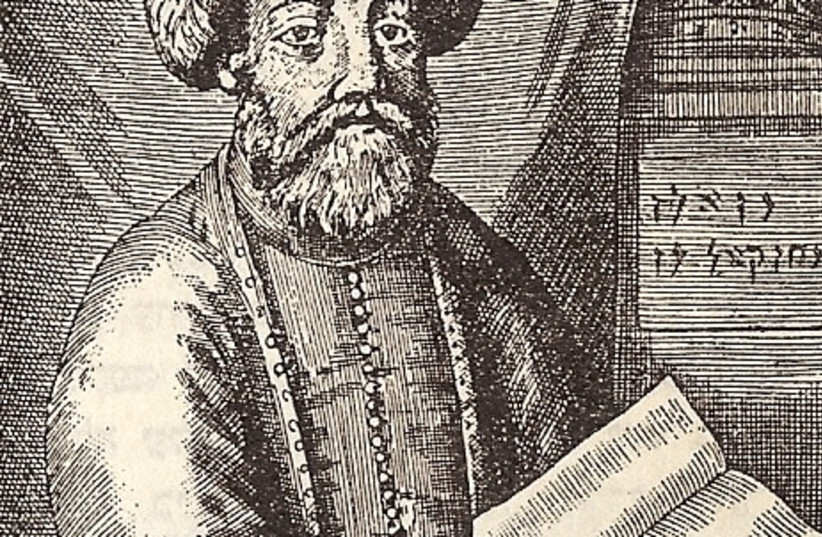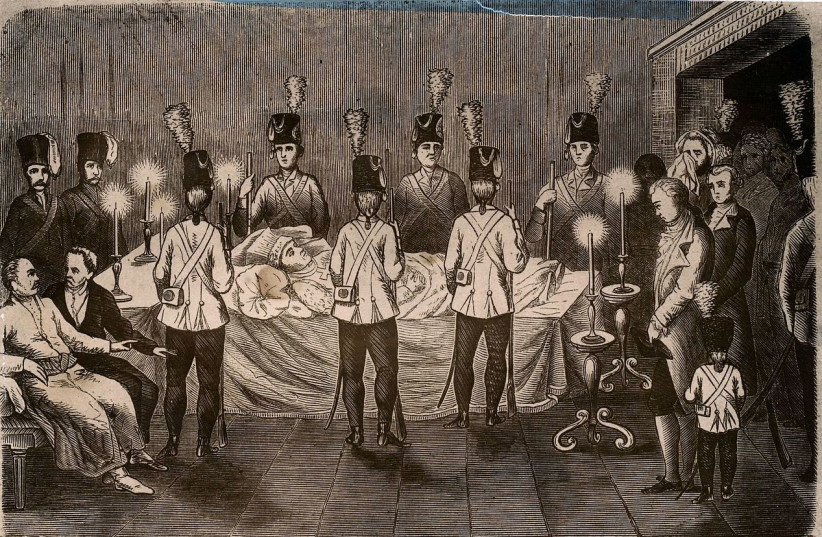December 10, 2021 marks 230 years since the death of Jacob Frank, a Polish Jew who claimed to be the messiah and reincarnation of Shabtai Zvi and who led his followers into a mass conversion to the Catholic Church.
Born Jakub Lejbowicz in Podolia, Poland (now Ukraine) in 1726 - the name Frank was commonly given by the Ottomans to Eastern Europeans who frequently moved between the Polish-Lithuanian and the Ottoman Empire, as he did - Frank frequently traveled in centers strong in the Sabbatean faith such as Smyrna (now Izmir, Turkey) and Salonica (now Thessaloniki, Greece).
The Sabbatean movement was derived from the followers of Shabtai Zvi, a 17th-century Messianic claimant who amassed a massive following in what is considered to be one of the most prominent acts of apostasy in Jewish history, especially within the last thousand years.
This movement was characterized by an emphasis on mysticism and Kabbalistic practices, as well as the influence of certain Muslim traditions and changes or outright violations of Jewish ritualistic practices.
Following Zvi's conversion to Islam in 1666 and his death in 1676, his movement had fractured into a few offshoots.

One of these, the Karakaş branch in Thessaloniki, was led by Baruchya Russo (Osman Baba), who claimed to be Zvi's reincarnation and who had pushed even further with violations of Jewish law, notably with the biblical sexual prohibitions.
Frank would marry into this branch after Russo's death and later gained the ability to gain a following himself. In 1755, Frank returned to Podolia and began preaching his supposed revelations. In January 1756 in Landskron (now Zarichanka), several Jews had witnessed a strange ritual with the rabbi's wife, topless and hair down with a bridal veil and a Torah scroll crown on her head as men and women, including many rabbis, danced around her wearing crosses, singing and drinking non-kosher wine.
This incident sparked a scandal - something that, according to some experts, was Frank's plan - and saw some arrests by the local authorities and outrage from rabbis.
This in itself was something unusual. The Polish-Lithuanian Commonwealth's rabbinic establishment had traditionally tried to be careful with Sabbateans, never naming specific people in herems (Jewish ex-communication) levied against Sabbateans. However, this time was different. Unlike other Sabbateans, who ignored the Talmud in favor of Kabbalistic teachings and took some Muslim influences, Frank's new faith, Frankism, took several inspirations and symbols from Christianity. And this was seen as problematic.
Polish law had interesting views on religion. Proselytization was banned for any religion, leading to a low rate of conversion in general, and there were several recognized religious authorities who were all required to respect and be accountable to their others. Frank's use of the cross was seen as a misuse of Christian symbols and was, therefore, a crime against the Catholic Church. And under Polish law, the rabbis had to do something.
So they did. In Brody, a Jewish-majority trading city in Poland, the rabbis did two things. First, they had issued a new ruling regarding the study of Kabbalah, stating it can only be studied by men over the age of 40 - something that was soon widely accepted across the Jewish world. Second, the rabbis came together with the Catholic Church to form a united front against Sabbateans and made all Jews obliged to expose the followers of this heretical movement. This herem against all Sabbateans was later confirmed in a session of the Council of Four Lands (Va'ad Arba Artzaot or the Jewish Sejm), as noted by the YIVO Institute, part of the American Jewish Historical Society.
In doing so, the Sabbateans, and Frank, in particular, were thrust into the public view, and the Frankists fought back.
The Polish-Lithuanian Commonwealth's rabbis contacted Bishop Mikołaj Dembowski, who was in charge of the diocese where the scandal took place. They urged him to condemn the Frankists, but this backfired. Frank's followers managed to form an alliance with Dembowski and claimed that rejecting the Talmud and embracing Kabbalah led to the conclusion of the Holy Trinity. A disputation was soon held in 1757 and Dembowski ruled in favor of the Frankists, even ordering the mass burning of Talmuds.
Things became more problematic in the following years after Dembowski died, especially since many in the wider Christian world condemned the 1757 disputation. In 1759, another disputation was held, and the Frankists had tried to push forward the Blood Libel, that Jews used Christian blood for rituals.
This disputation was inconclusive, due in no small part to pressure from the Vatican.
It was around this time that Frank made two major moves. First, he began openly referring to himself as the messiah and the reincarnation of Shabtai Zvi. Secondly, he and thousands of his followers were baptized, converting to Catholicism.
This conversion was shocking as, while mass conversions from Judaism to Catholocism or Islam had happened before, they were usually under duress. This, however, was entirely a willing choice.
Further, there was also an immediate benefit. Per a 1588 Lithuanian law, Jews who converted to Christianity would be made members of the nobility, something that now happened to Frank and many of his followers. By 1790, it is said that there were 26,000 Jewish baptisms in the Commonwealth.
In fact, some theorize that this law was later revoked in 1764 due precisely to this mass conversion, though an amendment said that would not apply to those who converted before 1764.
Frank himself was baptized a second time in Warsaw on September 17, with Polish-Lithuanian Commonwealth King August III serving as his godfather. From here, Frank began to thrive, living ostentatiously as a member of the Polish-Lithuanian gentry.
However, Frank's fortune wouldn't last.
The Frankist religious doctrine focused heavily on transgressions of every sort, seen as "redemption through sin." Some experts compared his beliefs to Gnostic philosophies that a "true God" was hidden by a "false God."
The most notable of these transgressive beliefs were sexual in nature, with rituals placing a heavy focus on orgies and other sexual violations, such as the practice of sexual hospitality.
A glimpse of this can be seen from a passage from Frank's own diary: "The Lord set up a guard in the courtyard made up of our people, so that no one might dare even to look through the window, and he himself went in with the Brothers and Sisters, undressed nude and also Her Highness, and ordered all those gathered [to do so]. . . . after that, the sexual relations took place thereafter according to his ordination."
Further, Frank had also stated that conversion to Catholicism was merely part of their journey. It was meant to be a necessary stage in the eventual revelation of a future religion called daas (based on the Hebrew word for religion or knowledge, daat).
Some of the Frankist thought can be seen in the text Zbiór słów pańskich (The Collection of the Words of the Lord), authored by Frank, written in Polish with many Hebrew, Yiddish and Ladino transliterations and quotes. This text was essentially a collection of notes of everything Frank said, even his casual conversations. This includes sermons on dreams, proverbs and fairy tales Frank told his followers, many of which are derived from the Zohar or Midrash, but with a major effort in rewriting narratives to invert them. For example, the delivery of the Torah on Mount Sinai to Moses and the Jews following the exodus from Egypt is described as a bad thing, a horrific act where an evil entity forced the Jews to follow harmful, toxic and nonsensical laws. To counter this, the text says, one must follow the "way to Esau."
But despite all this, Frankists still kept a number of Jewish beliefs and traditions. They reportedly kept Shabbat, the Jewish Sabbath, on Saturday, only married among themselves, circumcised the men and even had separate burials from Christians.
Eventually, people became suspicious of Frank and his followers, and in 1760 he was arrested, convicted of heresy and imprisoned.
But this imprisonment, which lasted 13 years, only made his fame grow. His followers gathered outside his prison in Częstochowa as he was seen as a martyr. He lived comfortably, practiced his rituals and was able to both receive guests and send messengers. This even reportedly included an attempt to encourage the Russians to free him from prison and offered to convert 20,000 Jews to the Greek Orthodox Church.
The Russians ultimately rejected this offer, but they did set Frank free after they took Częstochowa in 1772.
Frank later moved to Moravia and continued to live extravagantly as a member of the aristocracy. He even visited the Hapsburg court in Vienna with his daughter, Ewa (later changed to Eve) and met with Austrian monarchs Joseph II and Maria Theresa. Indeed, the Austrian monarchy reportedly took a keen interest in Frank, intending to capitalize on an idea of using a Sabbatean network in the Ottoman Empire as a possible war between Austria and the Ottomans seemed to loom in the near future.
But this fell through, and Frank was forced to pay his debts and leave, which he did in 1786 before moving to Offenbach am Main. Here, his health began to significantly deteriorate until his death on December 10, 1791, of apoplexy.

Despite the death of the sect's charismatic leader, the Frankists continued on under the leadership of Eva Frank, who was declared the incarnation of the shekinah, God's feminine aspect, and is to this day the only woman to have ever been a Jewish messiah claimant.
Other Frankists were active in the French Revolution, and some were said to have even considered Napoleon Bonaparte as a messianic figure.
Some Frankists even immigrated to the United States. In fact, Louis Brandeis, the first Jew to ever serve on the Supreme Court, was the child of two Frankists.
But ultimately, the Frankist movement would not survive for long. Despite being active in Offenbach, Warsaw and Prague, it would die out in the 19th century. There is evidence exists the Frankists as a social group was still around even until the 1880s, but it is doubtful that the original doctrine was still being taught.
Today, Frankist thought has essentially died out entirely. The last remnants of his teachings and texts are housed in the Jagiellonian Library in Kraków and in the H. Łopaciński Public Library in Lublin.
